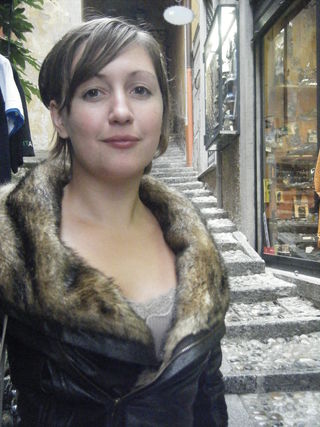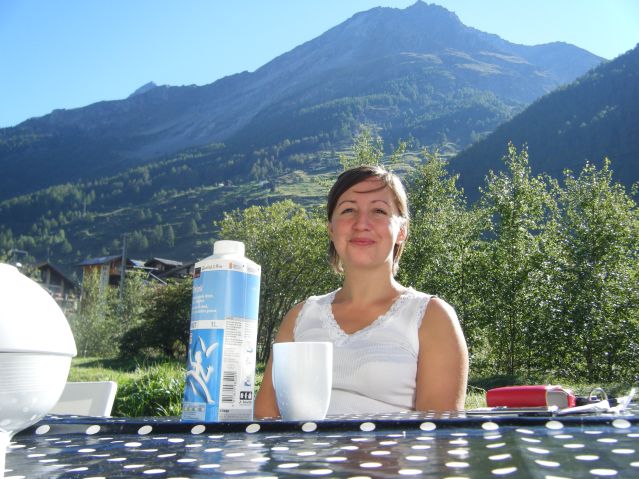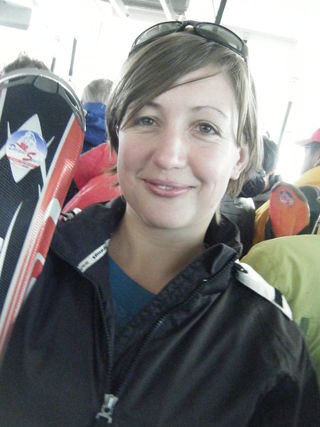Cognition
Constructing a Character after Anorexia
A holiday thinking about what it is to be me
Updated November 28, 2023
What does it mean to create a character for oneself, a character that isn't just defined by an eating disorder? Does anyone really construct a character, or is this something one rather falls into, or lets emerge?
These are questions I've been musing on over the past fortnight. My boyfriend and I have just returned from ten days travelling through Italy and Switzerland with my father and his partner, in his camper van -- an impressive vehicle with two double beds inside and black cow spots recently added to the outside. We spent the first day lounging by a backwater of Lake Como, with sun pouring down and mountains all around -- the other campers mostly foreigners, Russians, Germans, and Dutch, but a few Italian men and girls wandering around, with an insouciance that belonged to a different world from the England we'd recently left.
In departures at Gatwick airport we'd been marvelling at the unease of the British: well-muscled men trying to look tough but ending up just looking gauche; women too skimpily clad and profoundly ill at ease with their own bodies. In Italy even the teenage girls exuded a carelessness through their tanned skins and tight tops that was beautiful to look at -- and the men converged with exuberant gestures and raised swift voices. I felt a little pasty and unsophisticated by comparison, but mostly just loved the sense that these were people happy in their own skins.

The next day we drove on to the chichi little lakeside town of Bellagio, and wandered around in the drizzle after an enormous lunch. As we left the busiest part of town and approached the water again, I saw a very slim girl, or young woman, with her mother, under umbrellas that shaded and somehow refined their faces. The girl had blonde hair tied back, very short denim shorts, a light white shirt, and a pale neat face. Perhaps partly because of the lunch of risotto and half a kilo of steak we'd just had, I felt a deep pang of envy even as I thought in horror of the time I imagined they must be having: she competing with her equally thin mother over how little they could eat and how much they could spend.
In itself it was nothing profound: a post-prandial envy of her slim refined elegance from my standpoint of stumpy dark ordinariness. But the next stage of the holiday brought about equivalent experiences: we reached a campsite in a village near Zermatt, up in the Swiss mountains, where people go to walk and climb and ski and cycle and paraglide. Walking past the van all the time were couples and families staying in tiny little tents, and I found myself admiring (/envying?), just as much as the pale prettiness of the girl glimpsed before, the straight up and down of the combats and walking boots and neat plaits and scrubbed faces of the campers here. There was one girl especially, cycling up one of the mountain passes as we drove down: with flushed clear features, and holding my gaze with a mixture of pain and envy as we passed her in our enormous cowavan. I think none of it was as simple as jealousy on my part. I felt myself drawn to these three contrasting lifestyles (the glamorous one, the outdoorsy, the athletic) in equal measure and without contradiction, and I think this response was the consequence of my feeling like something of a blank slate, an unmoulded lump of clay, a cipher for any number of potential lifestyles, appearances, attitudes.
Until now, this feeling has perhaps been in abeyance because there's been, uppermost, the task of getting physically well again. But now that this stage is drawing to an end, other facets of recovery are becoming dominant. I feel that nothing in or about me is fixed: my figure is still changing in small ways, as are my attitudes to everything, in ways I could never have predicted: enjoying The Wire, liking a biscuit with tea in the morning, deciding to learn Polish, etc. etc. And so, every attractive woman I see, I feel as though I could -- should, even -- be her; I feel vicariously the satisfaction of having committed myself to a single path through life.
Then I wonder whether not choosing a path is a more authentic way of living -- a braver, less trapped one. Maybe as soon as one has ‘chosen' a path, one sees the charms of all the others only too clearly, or realises that one didn't choose at all, but fell, or drifted. Maybe not knowing what ‘type of person' one is is a more real way of existing, as well as more delightful, if one's brave enough for it. But such bravery implies a fluid flexibility, an ability to adapt to what circumstances dictate, and I know that I don't really do that at all: I wear the same sorts of clothes whether I'm working or camping or going out in the evening; I need tea in the morning and time to myself and lots of sleep.

Perhaps this is why the whole process of recovery lasts so long and is so difficult: because you have to find a new self, or a new way of living without one, with an urgency that is otherwise rare in life. Everything was so simple before, in this sense: I was simply anorexic: cared about nothing more than about food, had my physique determined by this, and my thoughts, and my activities (such as they were), and my outlook on the world. Now I feel that despite having habits, some from the old days, some new, the connective tissue that might make them meaningful, legitimate, or necessary, has gone, and needs replacing, or substituting with something -- even just a confidence that that sort of thing is superfluous.
All this scares me, but it's exhilarating too; and sometimes, in my calmer moments, I even feel luckier than those who are committed, or trapped. Again, though, this could be the very worst sort of self-deceptive self-entrapment: in a role that thinks itself superior (just as the anorexic role did), but makes concessions to nothing and is, in fact, nothing except sterility.
Another element in all this might be the lingering apprehension at the allure of the old role: I don't yearn for it, or really feel any danger of falling back into it, but I do, now and then, at the sight or mention of someone very thin or fussy over food or obsessed with exercise, feel how I still instinctively lean in that direction, mentally. I have abandoned that path for good, but very recently still. And although I despise the path of disordered eating now, I do so with such vehemence because it makes me feel inadequate -- just in the few seconds before my trained logic moves in and deconstructs that feeling.
Well, all this culminated in some hours of a quite dark depression, which I finally shifted with a long solitary walk and some tea and chocolate afterwards. Two days later we went summer skiing on the Klein Matterhorn glacier, which was splendid: awe-inspiring scenery, amazing snow, and one fun red run. And everywhere there were national ski teams -- Swiss, Austrian, Canadian -- in skin-tight body suits, practising their slalom or downhill technique with stupendous speed and skill. Then, thinking of my brother and his similar if not quite elite-level skill, I realised what the final facet of this sense of being adrift was.

It was the knowledge of having spent much of the ten years of my illness caring about nothing so much as the cost and weight and calorific content of my lettuce and bread and low-fat margarine and chocolate, and therefore having lost a great swathe of life which could have been spent becoming expert at something: at skiing or piano-playing (both of which I'd once loved), or another language, or any number of things. For a long time I forfeited the chance to excel at something physical, or sociable, or in any way substantial -- in exchange for the empty talents of memorising calorie counts for different breakfast cereals, and training myself to live with permanent hunger.
Now, though, is my chance to make good on all these missed opportunities, and I do love the sense of life widening rather than narrowing, the sense that I could be anyone I choose, and that in fact I needn't choose to be anyone in particular. No doubt we all have lists -- explicit or vaguely intuited -- of the character traits we would like to possess, and would like others to perceive in us, and no doubt all of us can shape ourselves (or enjoy the illusion of shaping ourselves) to a given degree and no further. A long and character-defining illness makes these tasks more urgent and more extensive, but perhaps also provides the privilege of this conviction: that not choosing, or pretending to choose, is as possible, and as important, as its opposite.
Choosing, or seeming to, and then making the choices irrevocable, is one thing the mentally ill and the obsessive do, and it feels lovely as well as frightening to have no particular plan: no plan for what to eat this evening or for what my hobbies this time next year will be, where my career will be in ten years, or how my character seems to others. It will all happen anyway, one way or another, and I look forward to seeing how.




